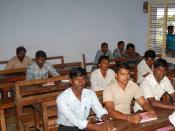Utilizing Assessment to Improve Student Life
The process of pre-University admission assessment can serve an important role in enhancing student motivation and achievement. Professors can help enhance student performance by sharing clearly defined learning goals. Through student involvement in the assessment process, students learn to take responsibility for their own learning. This feeling of accountability and control may increase the students' intrinsic motivation to learn and can heighten success. Also, Professors have the opportunity to help students succeed through the implementation and communication of quality assessments. Black and William (1998) define assessment broadly to include all activities that teachers and students undertake to get information that can be used analytically to alter teaching and learning. This definition considers assessment as an involved practice. Richard Stiggins describes classroom assessment as "the process of gathering evidence of student learning to inform instructional decisions" (2005, p. 5). He also states that for assessment to be effectively utilized, accurate information must be acquired and the assessment should not only reflect student achievement but also enrich student motivation and improve student success (Stiggins, 2005).
The diverse nature of pre-University assessment creates a challenge in knowledge, in preparation and in effective use by teachers.
Drawing on survey responses, transcript data, and results from the Collegiate Learning Assessment (a standardized test taken by students in their first semester and at the end of their second year), researchers concluded that a significant percentage of undergraduates are failing to develop the broad-based skills and knowledge they should be expected to master. A growing number of students are sent to college at increasingly higher costs, but for a large proportion of them the gains in critical thinking, complex reasoning, and written communication are either exceedingly small or empirically non-existent. At least 45 percent of students do not demonstrate any statistically...


